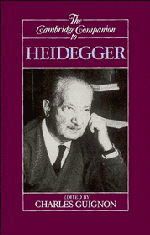Book contents
- Frontmatter
- Introduction
- 1 The question of being
- 2 Reading a life
- 3 The unity of Heidegger's thought
- 4 Intentionality and world
- 5 Time and phenomenology in Husserl and Heidegger
- 6 Heidegger and the hermeneutic turn
- 7 Death, time, history
- 8 Authenticity, moral values, and psychotherapy
- 9 Heidegger, Buddhism, and deep ecology
- 10 Heidegger and theology
- 11 Heidegger on the connection between nihilism, art, technology, and politics
- 12 Engaged agency and background in Heidegger
- 13 Wittgenstein, Heidegger, and the reification of language
- Bibliography
- Index
Introduction
Published online by Cambridge University Press: 28 May 2006
- Frontmatter
- Introduction
- 1 The question of being
- 2 Reading a life
- 3 The unity of Heidegger's thought
- 4 Intentionality and world
- 5 Time and phenomenology in Husserl and Heidegger
- 6 Heidegger and the hermeneutic turn
- 7 Death, time, history
- 8 Authenticity, moral values, and psychotherapy
- 9 Heidegger, Buddhism, and deep ecology
- 10 Heidegger and theology
- 11 Heidegger on the connection between nihilism, art, technology, and politics
- 12 Engaged agency and background in Heidegger
- 13 Wittgenstein, Heidegger, and the reification of language
- Bibliography
- Index
Summary
As the twentieth century draws to a close, it is increasingly clear that Heidegger will stand out as one of the greatest philosophers of our times. His writings have had an immense impact not only in Europe and the English-speaking world, but in Asia as well. And his influence has been felt in areas as diverse as literary theory, psychoanalysis, rhetoric, ecology, and theology. The recent explosion of interest in Heidegger has come as a surprise to even his most ardent admirers. In the fifties and sixties it was still possible to consign Heidegger to the “Phenomenology and Existentialism” bin of the philosophy curriculum, treating him as the student of Husserl and precursor of Sartre. His talk about angst, guilt, death, and the need to be authentic seemed to place his work well outside the range of topics making up the mainstream Anglo-American curriculum. Though he was read in France, he was largely ignored in the English-speaking world.
- Type
- Chapter
- Information
- The Cambridge Companion to Heidegger , pp. 1 - 41Publisher: Cambridge University PressPrint publication year: 1993
- 17
- Cited by

